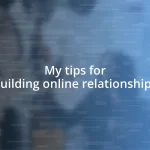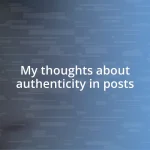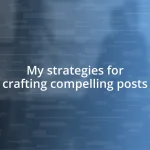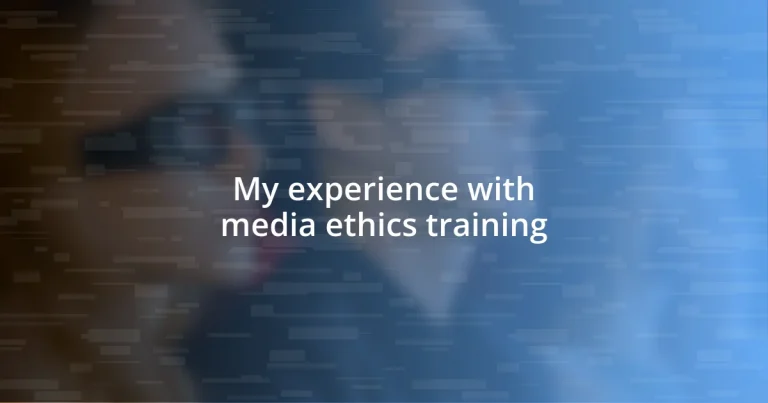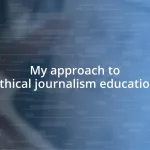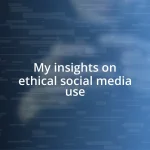Key takeaways:
- The author’s skepticism transformed into a commitment to ethical storytelling through workshops that emphasized the importance of empathy and understanding the human element behind stories.
- Key concepts in media ethics—accuracy, fairness, and accountability—are foundational for building trust and credibility in journalism.
- Applying media ethics in practice involves navigating dilemmas with a balance of truth-seeking, empathy, and respect for individuals’ privacy, highlighting the ongoing nature of this commitment in real-world reporting.
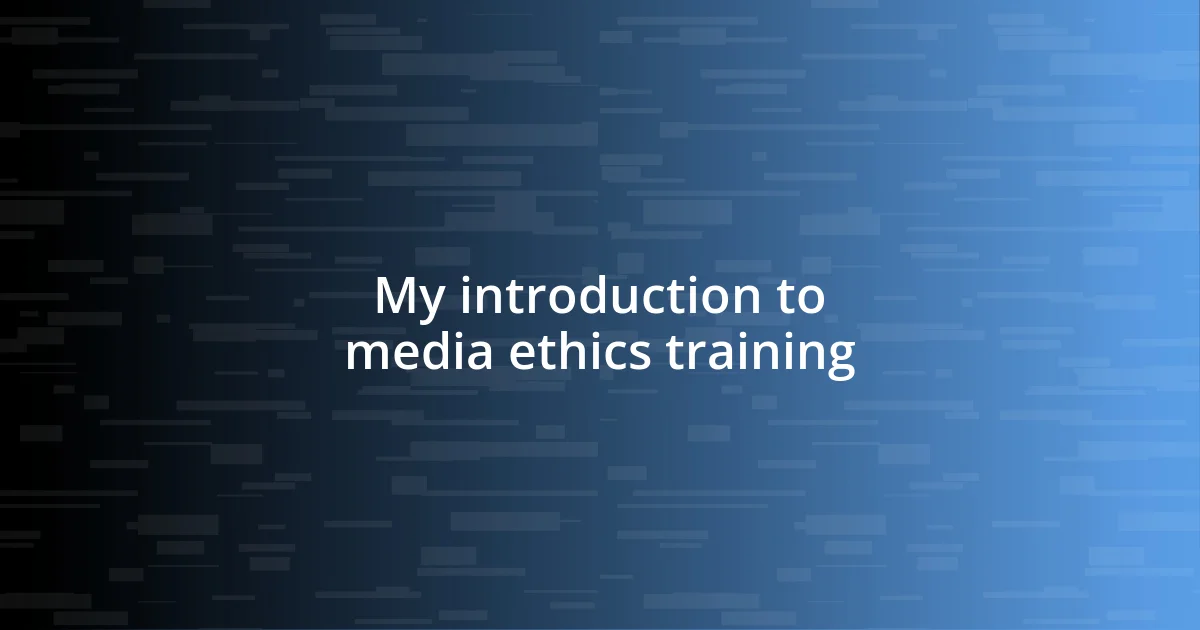
My introduction to media ethics training
My journey into media ethics training began unexpectedly during a workshop designated for aspiring journalists. I remember sitting there, skepticism bubbling beneath my surface, as the facilitator discussed inherent biases and the responsibility that comes with shaping public discourse. Was I truly ready to grapple with the moral weight of my future profession?
As the sessions progressed, my initial doubts shifted into a deeper appreciation for the complexities of ethical storytelling. One moment that stands out to me is when a colleague shared a harrowing experience of publishing a misleading headline that tainted a community’s reputation. That story hit home—how easily can our words wield power, for better or worse? It made me realize that with every story I would tell, I’d hold a piece of someone’s truth.
By the end of the training, I felt a palpable shift within myself. Not only did I gain a foundational understanding of ethical principles, but I also developed a personal commitment to upholding integrity in my work. This journey taught me that ethics in media is not just about following guidelines; it’s about cultivating empathy and respect for the diverse narratives we encounter every day. How could I approach storytelling without considering the human element behind it?
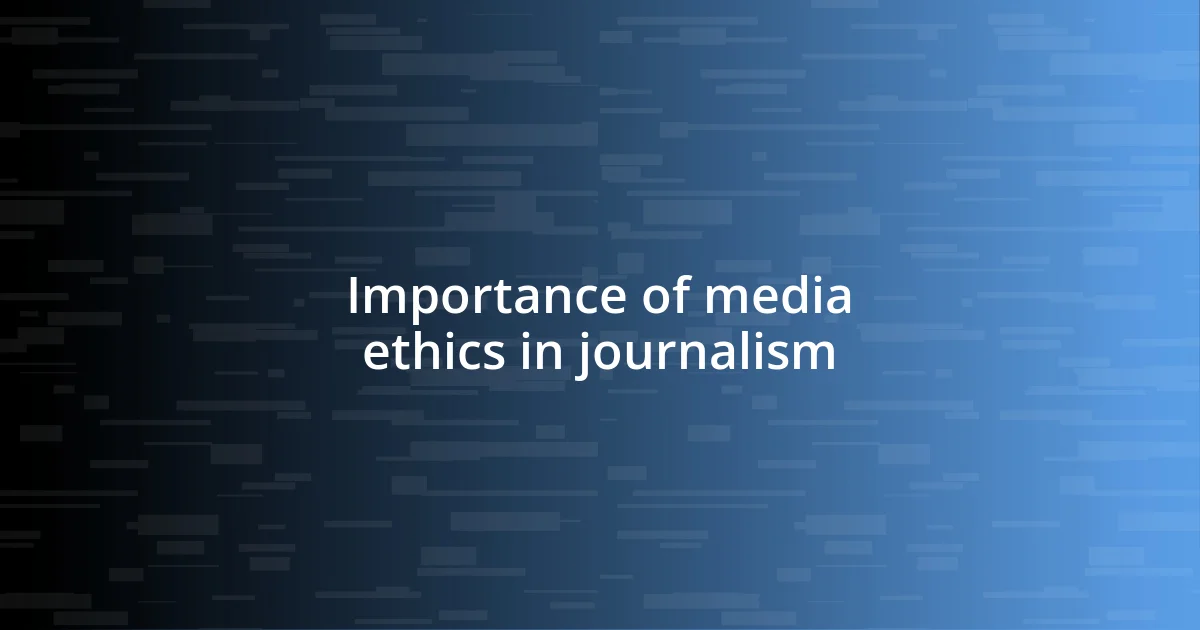
Importance of media ethics in journalism
Understanding the importance of media ethics in journalism became invaluable to me as I navigated the complexities of reporting. I vividly recall a particularly challenging assignment where I was tasked with covering a sensitive community issue. My first instinct was to dive right into the facts, but I soon realized that I needed to consider the potential fallout from my words. The responsibility to accurately represent people’s lives and stories weighed heavily on my mind. It was a transformative moment that underscored how ethical journalism not only builds trust but also protects vulnerable voices.
- Upholding integrity in journalism reinforces public trust.
- Ethical storytelling fosters an environment where diverse perspectives can thrive.
- It helps mitigate the risk of misinformation and its damaging consequences.
- Journalists equipped with ethical guidelines can navigate tensions in reporting more effectively.
- A commitment to ethical practices empowers journalists to speak truthfully for those who may not have a platform.
When I reflect on ethical dilemmas faced daily in journalism, I often think about one of my mentors who illustrated the power of discerning truth from sensationalism. Their insistence on prioritizing dignity over drama profoundly impacted how I approached my stories, reminding me that each headline could shape perceptions and lives in profound ways. Seeing journalism through an ethical lens has made me a more thoughtful writer, encouraging me to seek fairness while advocating for accountability, and ultimately, a more informed society.
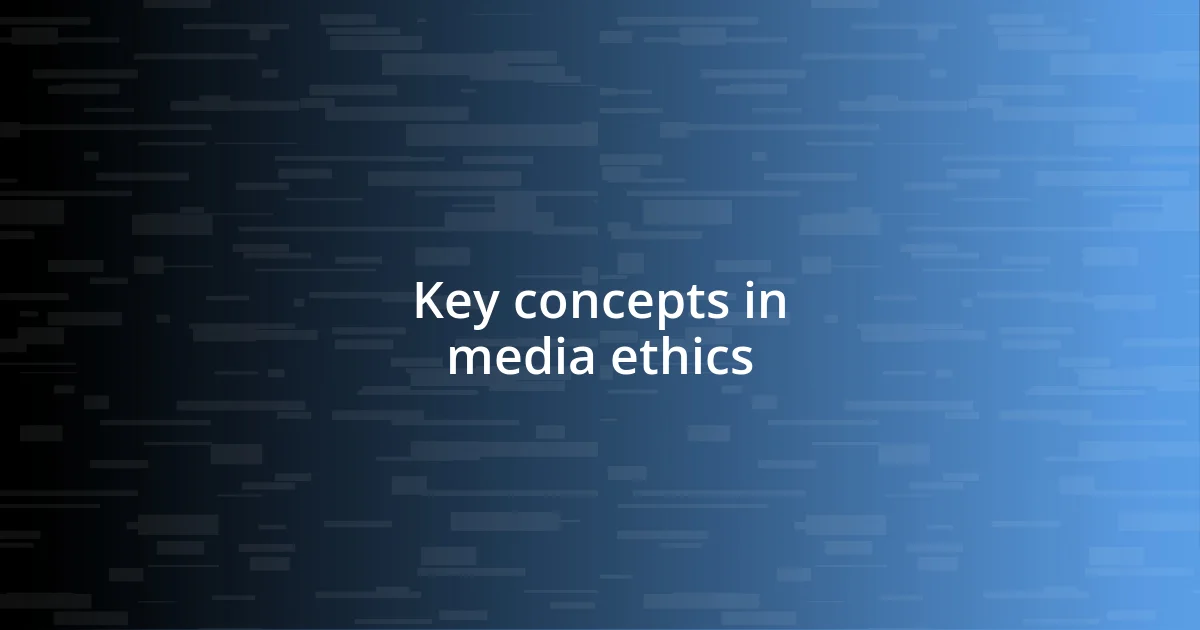
Key concepts in media ethics
Understanding media ethics involves exploring key concepts that form the bedrock of responsible journalism. One of the most critical principles is accuracy, which I learned can be a heavy burden during my training sessions. I remember a simulation we did where we had to fact-check a breaking story under pressure. The tension was palpable, and that exercise reinforced how crucial it is to verify information before publication. The lesson stayed with me: accuracy isn’t just a checkbox; it’s the foundation for credibility and trust in journalism.
Another vital concept is fairness, which extends beyond just being unbiased in reporting. It’s about actively seeking diverse viewpoints and representing them genuinely. I recall an instance where my reporting on a local debate could have skewed towards sensationalism, but instead, I focused on presenting a balanced narrative. That choice not only enriched my storytelling but also fostered a sense of respect within the community. It was a vivid reminder that our role as journalists is to elevate conversations, not exploit them.
Finally, there’s the idea of accountability. In my early days of writing, I published an article that unintentionally misrepresented a subject’s statement. The backlash made me painfully aware of my responsibilities. Accountability is about owning our mistakes and learning from them. This personal experience taught me that as journalists, we’re not just storytellers; we’re stewards of the truth, and that requires a commitment to ongoing self-reflection and growth.
| Key Concept | Description |
|---|---|
| Accuracy | The necessity of verifying facts to ensure credibility in reporting. |
| Fairness | The commitment to representing diverse viewpoints and avoiding bias. |
| Accountability | The responsibility for our words and actions, including owning mistakes. |
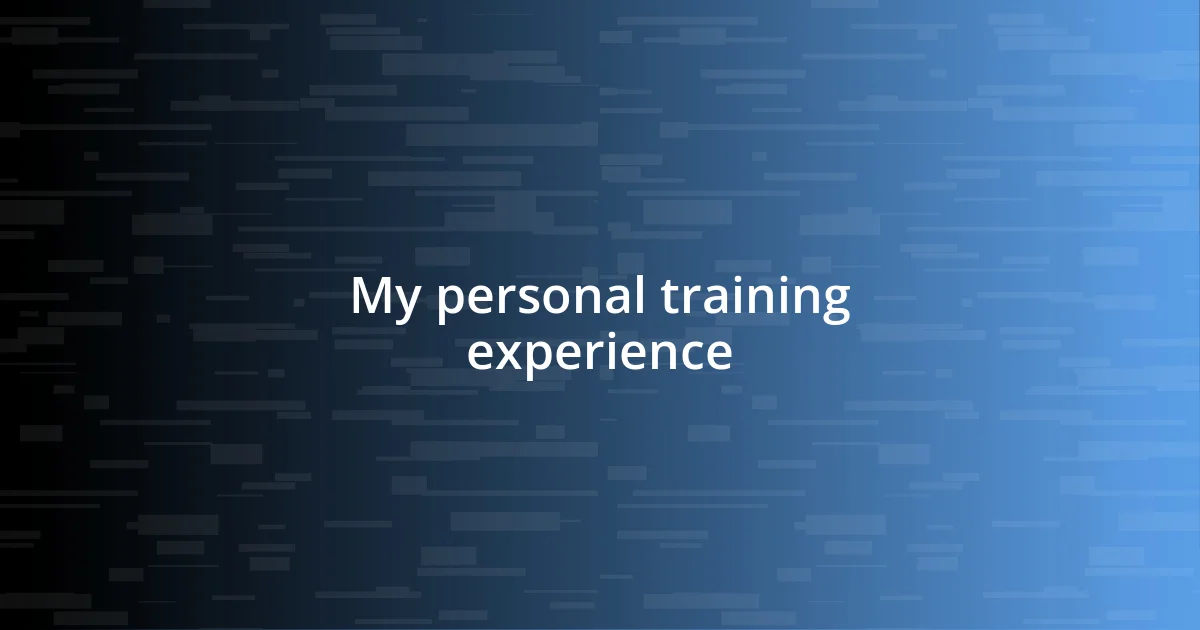
My personal training experience
My personal training in media ethics began with a series of intense workshops that pushed me beyond my comfort zone. During one session, we engaged in role-playing exercises where we had to defend our ethical choices in a mock editorial meeting. I can still remember the adrenaline pumping through my veins as I argued for the protection of a source’s identity. It was eye-opening to realize how these discussions weren’t just theoretical; they directly impacted the kind of journalist I aspired to be.
I recall a moment when we analyzed a controversial piece that straddled the line of ethical reporting. My peers and I debated fiercely about the implications of our choices in framing the narrative. It made me wonder: how many stories go untold because journalists shy away from difficult conversations? This revelation deepened my conviction that ethical journalism should never shy away from nuance. It reminded me that every story carries weight, significantly influencing public perception.
Moreover, the emotional toll of grappling with ethical decisions became evident during my training. I found myself reflecting on a personal misstep from an earlier reporting experience, feeling a mix of embarrassment and determination. Mistakes are part of the journey, aren’t they? What mattered most was the commitment to learn and grow from these experiences, ensuring that I could better serve my community through responsible storytelling in the future.
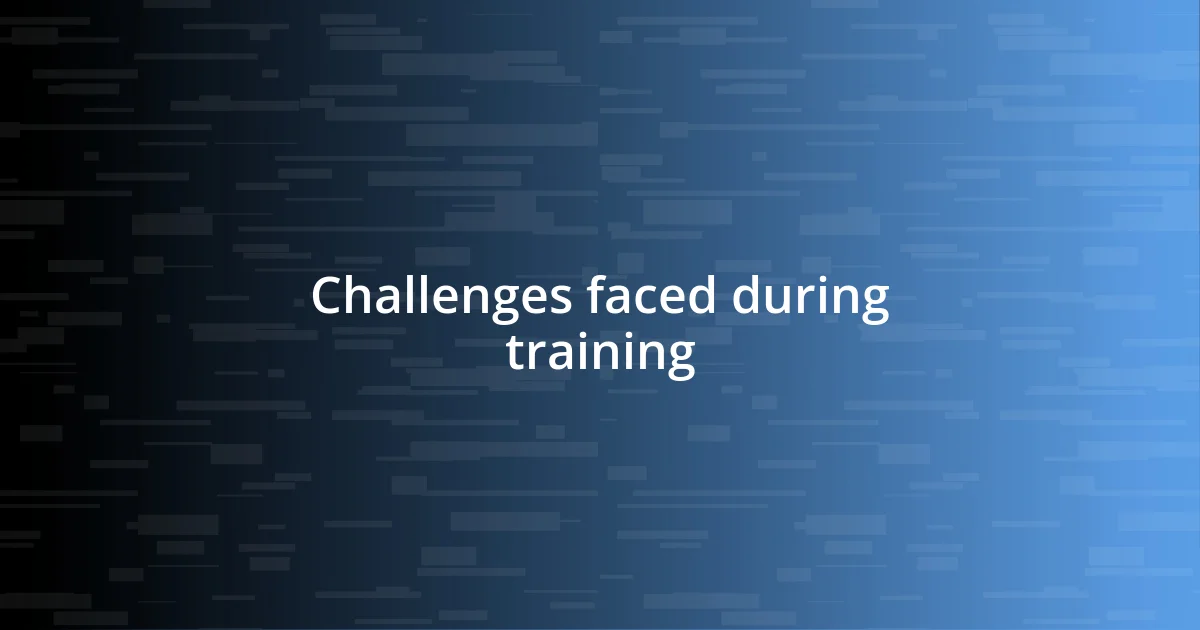
Challenges faced during training
One challenge I faced during training was the overwhelming volume of ethical dilemmas that arose in case studies. I vividly remember one particular scenario that left me questioning my moral compass—a story about a public figure whose private life was under scrutiny. Engaging with my peers, I felt the weight of our discussions. Who am I to decide what should be public knowledge? This question haunted me for days, reminding me that ethical choices often come with significant personal conflict.
Another hurdle was managing the fear of inaction when faced with ethical decisions. In one workshop, we were tasked with responding to a breaking news event that had multiple angles. I struggled to decide which perspective to elevate. I remember sitting in silence while others spoke passionately. What if I chose the wrong angle and let down a community’s voice? This moment highlighted the necessity of not only having ethical guidelines but also the courage to apply them under pressure.
Lastly, there was the emotional challenge of confronting biases I didn’t initially recognize in myself. During a group exercise, we were asked to analyze our own reporting styles for potential biases. I found myself reflecting on how my upbringing had subconsciously influenced my narrative choices. Realizing this was tough; it felt like looking in a mirror that revealed parts of myself I wasn’t proud of. But acknowledging these biases was crucial—how could I claim to uphold ethical standards if I didn’t confront my own perspectives? That realization spurred a deeper commitment to continuous self-examination in my journey as a journalist.
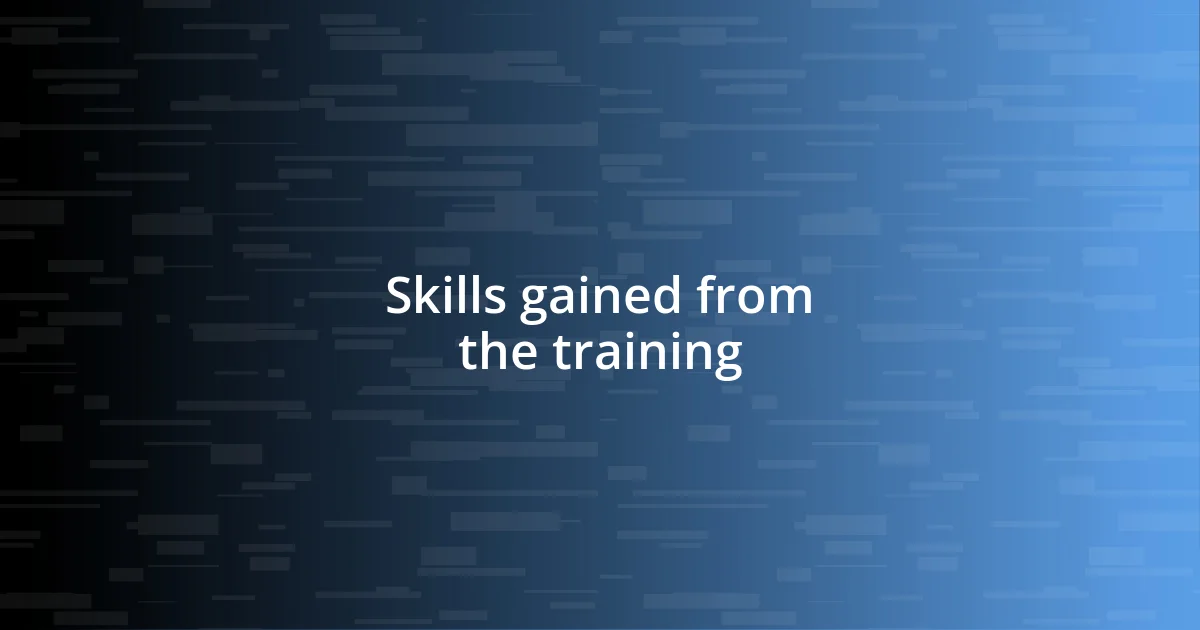
Skills gained from the training
The skills I gained from media ethics training were transformative and vital in shaping my journalistic approach. One of the most significant skills was the ability to critically analyze situations from multiple ethical perspectives. I can still recall a workshop where we discussed the implications of clickbait titles. It was eye-opening to realize how a catchy headline could misrepresent the content and sway public opinion. This revelation sparked my commitment to prioritize integrity over sensationalism in my writing.
I also honed my communication skills during the training, especially when it came to advocating for ethical practices. Engaging in mock debates was particularly enlightening. I remember a heated discussion about transparency and accuracy, where I had to articulate why misreporting could erode trust between journalists and the public. It taught me that effective communication isn’t just about delivering information—it’s about fostering relationships built on trust and credibility. How could I expect my audience to believe in my work if I didn’t uphold those values myself?
Lastly, I developed a stronger sense of empathy, which I believe is crucial for any journalist. There was a moment during a small group discussion when we were reflecting on the real-world consequences of our stories. We shared personal experiences where our reporting had impacted individuals’ lives. I vividly remember sharing a story about an interview gone wrong, where I realized I hadn’t considered the subject’s feelings. That was a wake-up call. Recognizing the human element behind every story helped me to appreciate the responsibility we bear as storytellers, pushing me to advocate for the voices often overlooked.
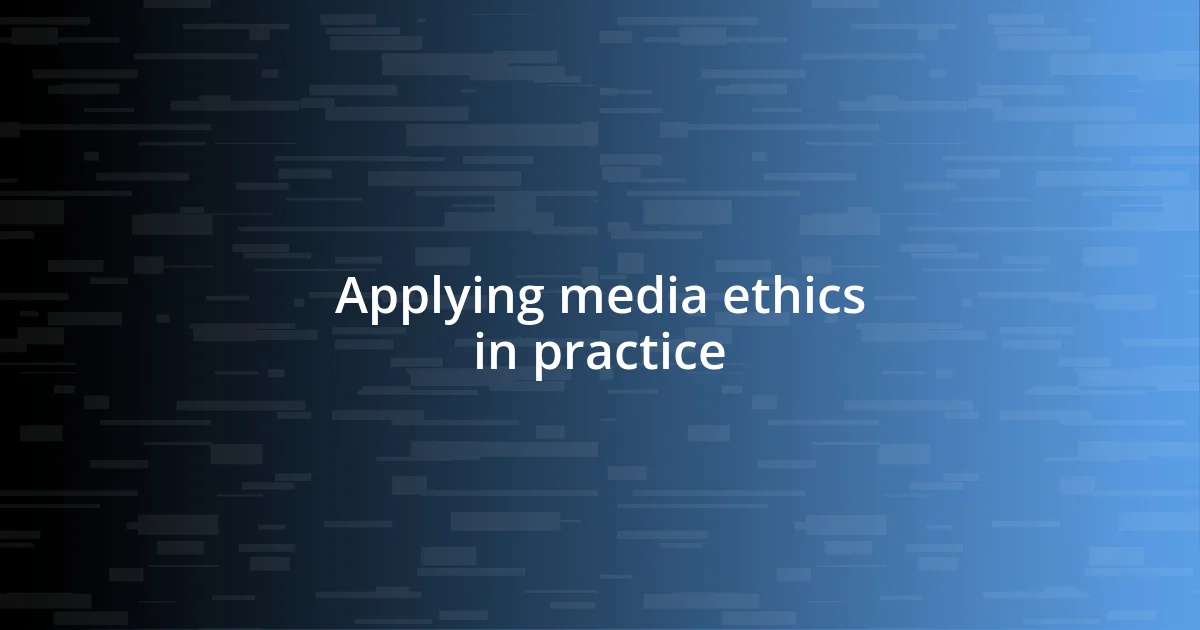
Applying media ethics in practice
Applying media ethics in practice involves navigating real-world scenarios where decisions can have far-reaching consequences. I recall a time when I was covering a local protest. It was my instinct to capture every detail, but I was faced with a dilemma when I overhead a sensitive conversation. Should I include that in my report? My heart raced as I weighed the potential impact on individuals involved. This moment taught me that applying ethics means balancing the pursuit of truth with empathy and respect for privacy.
One memorable instance that underscored the need for ethical diligence happened when a colleague rushed to publish a story based on an unverified tip. I felt a pang of anxiety as I watched the unfolding situation. Should I intervene or let it happen? Ultimately, I voiced my concerns. As it turned out, the information was inaccurate and potentially harmful. That experience reinforced my belief that courage in journalism isn’t just about reporting; it’s about protecting the integrity of the information we share. It turns out that having the guts to adhere to ethical standards can be just as crucial as having the drive to break a story.
I also learned that applying media ethics is an ongoing journey, not a destination. During a recent interview with a young artist, I found myself drawn to their struggles with mental health. Instead of merely painting a sensational picture, I chose to ask questions that fostered trust. As we talked, I realized the importance of weaving ethics into every interaction—ensuring that I wasn’t just a reporter but a compassionate listener. This made me wonder: how often do we pause to consider the broader impact of our narratives? It’s these moments of reflection that keep me grounded in my ethics, reminding me that the stories we tell shape the world in profound ways.






